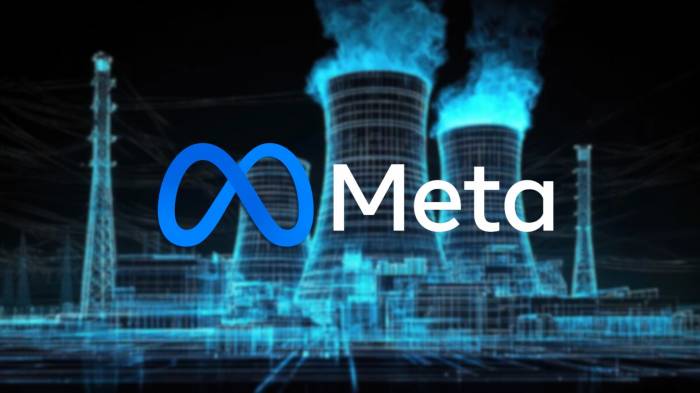
Photo: X social media platform
By Samir Muradov
Meta has recently announced its intention to hire specialists in nuclear energy, signaling a bold step towards integrating atomic power into its operations. This initiative highlights the company’s commitment to ensuring sustainable energy solutions for its rapidly growing technological demands, particularly in artificial intelligence (AI). The announcement also reflects a broader trend among major technology corporations, which are increasingly exploring nuclear energy as a reliable and clean power source to meet rising electricity consumption needs.
Meta’s ambitious goal is to increase nuclear generation capacity in the United States by 1 to 4 GW by the early 2030s. This will provide a stable and scalable energy foundation to support the company’s data centers, which are critical for AI development and other digital infrastructure. The urgency of such initiatives becomes apparent when considering projections from Goldman Sachs, which estimate that energy consumption by U.S. data centers will triple by 2030, requiring approximately 47 GW of additional generating capacity. Against this backdrop, nuclear energy is emerging as a preferred choice due to its ability to deliver large-scale, carbon-free power consistently.
This move is not just about addressing immediate energy needs; it is a forward-looking strategy to ensure long-term resilience and sustainability. The adoption of nuclear power aligns with Meta’s broader environmental, social, and governance (ESG) objectives. By incorporating nuclear energy into its energy mix, the company aims to minimize its carbon footprint, enhance the reliability of its operations, and contribute to the global transition towards cleaner energy systems.
Meta’s foray into nuclear energy mirrors similar efforts by other technology leaders. Microsoft, for instance, recently signed a 20-year energy purchase agreement with Constellation Energy to restart the Three Mile Island nuclear plant in Pennsylvania. This landmark initiative marks the first-ever restart of a nuclear plant in the United States, showcasing the growing confidence in nuclear energy’s potential. Amazon has also announced its intention to integrate nuclear power into its operations, while Google is actively evaluating the role of nuclear energy in supporting its AI projects and reducing greenhouse gas emissions.

US Nuclear Regulatory Commission Headquarters in Rockville. Photo: Flickr
While these developments underline the growing importance of nuclear energy, they also bring to light several significant challenges. Regulatory hurdles, particularly from the U.S. Nuclear Regulatory Commission, have long been a bottleneck for the nuclear sector. The licensing process for new nuclear facilities remains complex and time-consuming, delaying the deployment of new projects. Moreover, supply chain disruptions, including the availability of enriched uranium, pose additional risks to the timely execution of these initiatives. Public resistance, often driven by concerns about safety, environmental impact, and waste management, further complicates the expansion of nuclear power in the United States.
Despite these obstacles, the U.S. federal government is taking proactive steps to rejuvenate the nuclear energy sector. Recognizing its potential as a cornerstone of energy security and climate policy, the White House has unveiled plans to triple the country’s nuclear power capacity by 2050. This ambitious agenda includes adding 200 GW of nuclear generation, with 35 GW targeted for deployment within the next decade. These initiatives are a testament to the government’s commitment to fostering a robust and sustainable energy ecosystem.
The strategic embrace of nuclear power by technology companies is driven by a combination of practical and visionary considerations. From an operational perspective, nuclear energy offers unparalleled reliability, ensuring uninterrupted power supply for energy-intensive facilities like data centers. Its capacity to deliver large amounts of clean energy aligns with global efforts to combat climate change. Moreover, investing in nuclear energy positions these companies as leaders in the transition to sustainable energy solutions, enhancing their reputation and appeal among environmentally conscious stakeholders.
Meta’s initiative to explore nuclear energy is also a recognition of the broader geopolitical and economic dynamics shaping the energy landscape. As countries worldwide grapple with energy security challenges, the ability to secure a stable, domestic energy supply becomes increasingly critical. For Meta and other tech giants, investing in nuclear power is not just about meeting their own needs but also about contributing to the resilience and independence of the U.S. energy grid.
This focus on nuclear energy represents a paradigm shift in how technology companies approach their energy strategies. By integrating atomic power into their operations, these corporations are not only addressing immediate challenges but also laying the groundwork for a sustainable and innovative future. This strategy aligns with the growing convergence of technology and energy sectors, where breakthroughs in AI and machine learning can further optimize the performance and safety of nuclear reactors.
The collaboration between tech companies and the nuclear industry also holds the promise of driving significant advancements in both fields. For instance, AI applications could be used to enhance the monitoring and maintenance of nuclear facilities, improve efficiency, and reduce operational risks. Conversely, the availability of stable and abundant nuclear power could accelerate the development of cutting-edge AI technologies, opening new frontiers in innovation.
Meta’s decision to invest in nuclear energy underscores a broader recognition that the future of technology is inseparably linked to sustainable energy solutions. While the journey is fraught with challenges, from regulatory bottlenecks to public skepticism, the potential rewards are immense. By leveraging nuclear power, Meta and its peers are not only addressing the pressing demands of today but also shaping the energy landscape of tomorrow. This integration of clean energy and cutting-edge technology is a powerful statement of the role corporations can play in driving global progress.